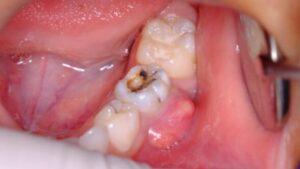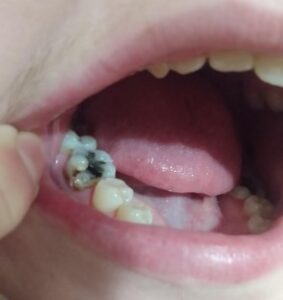Tooth infections, also known as dental abscesses, can be painful and potentially dangerous if left untreated. While the severity and progression of a tooth infection can vary from person to person, it is important to recognize the potential risks associated with these infections and seek timely dental care. In this article, we will explore the topic of tooth infections, their potential complications, and the importance of seeking prompt treatment to prevent severe consequences.
Understanding Tooth Infections
A tooth infection occurs when bacteria invade the dental pulp, the innermost part of the tooth, through a cavity, crack, or other forms of dental damage. These bacteria can multiply and lead to the formation of pus and an abscess. Common symptoms of a tooth infection include severe toothache, swelling, sensitivity to temperature, and sometimes fever or swollen lymph nodes.

The Potential Risks
While a tooth infection may start as a localized problem, the infection can spread to surrounding tissues and organs, causing a range of serious complications. If left untreated, a tooth infection can lead to:
Spread of infection
The bacteria from a tooth infection can spread to the jawbone, sinuses, and surrounding soft tissues. This can cause cellulitis, a bacterial infection of the skin and underlying tissues. In severe cases, the infection can even spread to the bloodstream, leading to sepsis, a life-threatening condition.
Facial swelling and pain
As the infection progresses, it can cause swelling and pain in the face and neck, affecting daily activities such as eating, speaking, and sleeping. The swelling can also obstruct the airway, causing breathing difficulties.
Bone and tooth loss
Prolonged infection can damage the surrounding jawbone, potentially leading to bone loss and weakening of the affected tooth’s support. In advanced cases, the tooth may become non-restorable, necessitating extraction.

Abscess rupture
In some instances, an abscess can rupture and release pus into the oral cavity. While this may provide temporary relief from pain, it can also lead to further complications or re-occurrence of the infection.
Systemic health implications
Emerging research suggests a potential link between oral health, including dental infections, and systemic conditions such as cardiovascular disease, diabetes, respiratory infections, and adverse pregnancy outcomes. While the exact mechanisms are still being studied, maintaining good oral health is crucial for overall well-being.
Seeking Timely Treatment
The consequences of a tooth infection highlight the importance of seeking prompt dental care. If you suspect a tooth infection, it is essential to schedule an appointment with a dentist as soon as possible. Dentists can diagnose the infection, prescribe appropriate antibiotics to control the spread of bacteria, and perform necessary procedures such as root canal treatment or tooth extraction to eliminate the infection source.
Prevention is Key
Preventing tooth infections is always preferable to treating them. Practicing good oral hygiene, which includes brushing twice a day, flossing regularly, and scheduling routine dental check-ups, can help maintain optimal oral health and prevent dental infections. Additionally, promptly addressing any dental issues such as cavities or cracks can prevent bacteria from infiltrating the tooth’s inner layers.
Conclusion
While the time frame for a tooth infection to become life-threatening varies, it is crucial to recognize the potential risks associated with untreated dental infections. Tooth infections can lead to severe complications that not only affect oral health but also impact overall well-being. By seeking timely dental care, practicing good oral hygiene, and addressing dental problems promptly, individuals can protect themselves from the potential dangers of tooth infections. Remember, prevention and early intervention are the key to maintaining a healthy smile and a healthier you.
